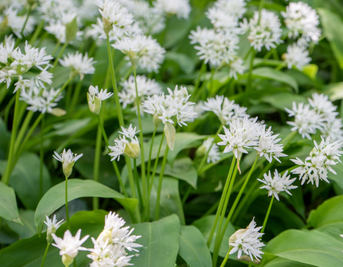Pollen Watch and the Virtues of Nettle
Here at Napiers we are a fan of products containing nettle for Spring time and Summer time. Our herbalists advise that adding nettle to your diet can help you to avoid the worst of the hay fever symptoms. Nettle has traditionally been drunk as a tea, a juice, a soup and can be steamed like spinach (and won't sting once it is heated!).
So how does nettle work?

We think that nettle is one of the best remedies for hay fever (also called allergic rhinitis). Studies in patients show that nettle (taken as capsules in most studies) helps reduce sneezing and itching caused by hay fever. This is probably because nettle has the ability to reduce the amount of histamine the body produces in response to allergens like pollen and dust, and prevents your mast cells from releasing inflammatory triggers (Roschek et al, 2009) thus providing hayfever relief.
In a trial by Mitman (1990), fifty-eight percent of people taking 600mg of nettle a day, reported relief of most symptoms and forty-eight percent stated it was more effective than other over-the-counter medications.
Our herbalists recommend that you try to maintain a daily dietary intake of around 600mg of nettle in total per day. This could be a mixture of teas containing nettles (3 cups daily), capsules containing nettles (200mg x 3), nettle juice (15ml x 3) or nettle used in your cooking. As long as you take it regularly you can mix the source. But you need to start taking this well before hay fever season starts for the greatest benefit.
Our Napiers Summertime Tea contains nettle as well as several other useful herbs like chamomile, eyebright and plantain in a tasty tea that you can drink hot or cold.
Pollen traps
Another sensible precaution is to use an ointment or balm made with beeswax as a pollen trap. Coating the inside of the nostrils with a simple non-allergenic Calendula Salve or similar, provides a slightly sticky surface to catch the pollen from the air that you breath in, and prevent it reaching more sensitive membranes.
Do you want to know the UK pollen count today?

Luckily for all of us who are prone to hay fever (possibly a fifth of the population!), the Met Office provides a forecast from March 21st onwards. Many of the tree pollens start early in March, the main one to watch out for being birch, which flowers at the end of March triggering off allergies in a quarter of hay-fever sufferers. And then grass pollens from the end of May.
Whether your hay fever symptoms are caused by tree pollens or grass pollens, it is a good idea to keep an eye on the pollen counts so you can predict the onset of the hay fever season and take preventative action! Although the Met Office doesn't publish the pollen count until the official start of Spring (21st March), my hazel trees have been in flower for a week now!
Hayfever symptoms
- Swollen, inflamed lining of the nose and eyes
- Itching of nose, eyes and throat
- Streaming, running nose and eyes
- Sore throat
- Sneezing
- Feeling miserable!
Met Office Pollen Calendar and Forecast
Can honey help?

As conventional remedies for hay fever can make you feel drowsy or worried about the long term effects, a lot of people look for natural cures for hayfever. Many people swear by a spoonful of honey a day. The thinking behind honey is desensitisation. Although bees collect heavy-grained pollen, honey can also contain small amounts of lighter pollens that cause allergic rhinitis. Taking a spoonful of honey a day, starting well before the pollen season, can help the body to desensitise in time.
A 50 person study was carried out with people taking either birch pollen honey, regular honey and conventional medication (Saarinen, Jantunen & Haahtela, 2011). The results were not significantly different between the two honey groups, however people taking birch pollen honey reported a 60% lower total symptom score, 70% fewer days with severe symptoms, and they used 50% less antihistamines than the conventional medicine group.
HONEY CAUTION
The only note of caution would be that if you are allergic to honey, don't try it for hay fever. Quite often people who are allergic to mugwort pollen can also be allergic to honey.
References
Mittman P. (1990). Randomized, double-blind study of freeze-dried Urtica dioica in the treatment of allergic rhinitis. Planta Med. 56:44-47.
Roschek B Jr, Fink RC, McMichael M, & Alberte RS. (2009). Nettle extract (Urtica dioica) affects key receptors and enzymes associated with allergic rhinitis. Phytother Res. 23(7):920-6. doi: 10.1002/ptr.2763. PubMed PMID: 19140159.
Saarinen K, Jantunen J, Haahtela T. Birch pollen honey for birch pollen allergy--a randomized controlled pilot study. Int Arch Allergy Immunol. 2011;155(2):160-6. doi: 10.1159/000319821. Epub 2010 Dec 23. PubMed PMID: 21196761.
Urtica dioica; Urtica urens (nettle). Monograph. Altern Med Rev. 2007 Sep;12(3):280-4. PubMed PMID: 18072824. Link to PDF file.

